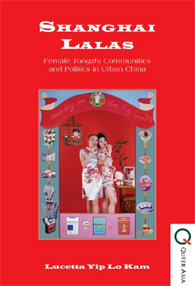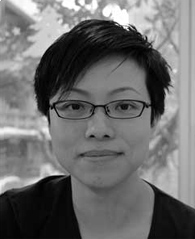Shanghai Lalas: Female Tongzhi Communities and Politics in Urban China
By Lucetta Yip Lo Kam
Paperback 152 pages
The Eleventh Volume in the Queer Asia Series
Published by the Hong Kong University Press, 2012
It may not be universally so, but I think it fair to say that reviewers are attracted to a book that is swift and rewarding to read. This reviewer certainly is. The most recent volume in the Queer Asia series from Hong Kong University Press is one such. Hong Kong academic Lucetta Kam’s Shanghai Lalas describes the world of lesbians in Shanghai, and to some degree, one suspects, much of urbanised China, though she does not claim so. This is a fine work of concise clarity and compassion that introduces in its 111 pages of text much, not only about the relatively recent development of lesbian communities in China’s major commercial city, but also about current Chinese social and political developments affecting its sexual minorities. Spanning much of the first decade of this new century, Kam’s research opens up a window into how, and how rapidly, Chinese queer life is changing.

Lala is the term for ‘lesbian’ most widely in use at the moment in Mainland China, a word adapted from the Taiwanese adaptation of the word ‘lesbian’. More formal and perhaps more contentious, the word tongzhi (used in Maoists days for ‘comrade’) is the Chinese word for ‘queer’ or ‘gay’. Developed originally in Hong Kong in the 1990s, tongzhi is a handy way of referring to the LGBT spectrum without the initials, though it is not accepted by all. Transgender men and women, for instance, may object to being included within its scope, as they can conceive the word as relating solely to sexual orientation, and they do not consider themselves necessarily ‘gay’. Nevertheless, tongzhi is a word widely in use by gay men and lesbian women in the Chinese world.
Lucetta Kam is an Assistant Professor in the Department of Humanities and Creative Writing at Hong Kong Baptist University. She is also a well-known figure in Hong Kong’s LGBT activist community. In 2001, she edited and illustrated a pioneering work in Chinese on lesbian lives in Hong Kong and the region. Translated, the title of this work was Lunar Desires: Her First Same-Sex Love in Her Own Words, and I had the pleasure of hearing Kam and some of her fellows read excerpts from the real life stories it contains when they were featured at a meeting of Hong Kong’s Tongzhi Literary Group some years ago.
Many of the themes that emerged from that work are repeated in her new study: the loneliness and isolation of many lesbians; the difficulties of coming out to parents and relatives; the impossibility of living a fulfilled lesbian life whilst accommodated in the confined family home; the unavoidable economics of needing to make a living in a modern but constricted society; and the despair that can arise from the fact that all these factors often make it impossible to realise the dreams that the internet and the western world have implanted. Shanghai Lalas shows it is as bad if not worse for lesbians struggling to break free of their heterosexual bonds in China.
Kam’s new book is organised in five chapters covering in a very logical sequence the social and political background to change in China, the way the issues connected with lesbianism are currently addressed by expert and layman in the People’s Republic, the difficulties with which society afflicts lesbian lives and the mechanisms that lesbians use to cope with them. It is based upon a series of formal interviews and informal meetings with lesbians in Shanghai conducted between 2005 and 2010. It is something of a relief to be able to advise that this is a book free of the contortions of theory and vocabulary that so often disfigure queer theory and so is accessible to the general reader. Kam writes well and persuasively; she is a pleasure to read.
Some major themes stand out in her account. The Chinese state decriminalised homosexuality (earlier classified as ’hooliganism’ and ‘sodomy’) in 1997 and declassified it as a mental disorder in the 3rd version of the Chinese Classification of Mental Disorders (CCMD-3) of 2001. These legal changes have been coupled with a gradual liberalisation of society through the loosening of work and residence rules. Simultaneously, the Chinese Government has given a growing acknowledgement to the tongzhi community in order to counter the spreading HIV epidemic (though this is, of course, largely an acknowledgement focussed upon gay men). So repression in China, though occasionally evident in the closure of bars or festivals, is gradually becoming more of a private phenomenon, and it is the private worlds of Kam’s informants that give her most of the issues that form the subjects of her book.

Families retain the expectation that daughters will marry and produce offspring, and lesbian daughters are not at all immune to the desires to fulfill their parents’ expectations and not to cause them grief or loss of face. So guilt is a powerful tool for conformity here, as are the economics of a single woman finding work and accommodation in China’s cities. Most single women cannot escape their families as they have nowhere else to live. Most could not live with a partner in the same place as their parents and to do so would have to escape to a city like Beijing or Shanghai, a solution not available to most. Almost none could be out at work.
Kam spends the last part of her book describing the coping mechanisms by which her informants escape the many traps these private pressures have dug for them. Aside from abandonment of all hope of a fulfilled life, many lesbians have three major avenues of escape, all involving marriage to men. The first is to marry, then conduct clandestine affairs without the husband’s knowledge, something that is done by some but advocated by few as it is dishonest and prone to disaster. The second is to marry then conduct affairs with the knowledge of the husband, a strategy that seems to work in practice for some, though it involves the risk of heartbreak all round. The third is to fake it all with a ‘Cooperative Marriage’ between a lesbian woman and a gay man. This is something happening more and more in China’s big cities, evidenced by the number of online advertisements from both sides looking for a partner. Whether this is a feasible strategy in the long run is as yet unclear, involving, as it does, an attempt to deceive – or seem to deceive – two sets of relatives and friends as well as colleagues at work and the legal organs of the state. Cooperative marriage seems to be a practice that started in China on any scale only in the second half of the 2000s and Kam thinks it too early to say if it’ll become a permanent feature of lala life.
Then there are the lucky few who can find work in the big city away from their family and live with a partner of their choice. There are some in Kam’s book who have managed this. Even fewer are those who are as yet out to their parents. Kam is very interesting in her discussion of lesbians’ views of the coming out process; more important to many than personal honesty, it seems, is caring for parents and avoiding giving them the trouble and loss of face they would meet were it to become known that their daughter was openly lesbian. The heavy burden of becoming a responsible citizen is one that few take lightly, and at present this is still militating against open lesbian lives.
Kam never lets her gaze wander far from the reality of the lives she is describing, and her handling of her informants and their views is careful, sympathetic and free of judgment Many of the stories she relates are very touching indeed. I shall close with a quotation, one she uses when discussing the trap to which faking marriage can lead. These are real women facing real issues and crises in their lives:
Within a year, my husband knew […] Now I believe that a married woman should not […] love another woman. If I had known three years ago that it would end up like this, no matter how much I loved her, I would have controlled [my feelings] because you end up hurting three persons. All three persons ended up in pain. If I had known it would turn out like this, I would rather have endured a bit of heartache in the beginning. It really is devastating.











 打印版本
打印版本



















读者回应
I understand that marriages between gays and lesbians also are used somewhat in some Islamic countries in North Africa. I think they could be a good way to establish oneself and survive until one meets a same-sex partner.
China is changing rapidly, but is still at the crossroads; let's hope it tuns out okay for LGBTs, unlike Islamic countries where things are going very badly.
I understand that marriages between gays and lesbians also are used somewhat in some Islamic countries in North Africa. I think they could be a good way to establish oneself and survive until one meets a same-sex partner.
China is changing rapidly, but is still at the crossroads; let's hope it tuns out okay for LGBTs, unlike Islamic countries where things are going very badly.
请先登入再使用此功能。